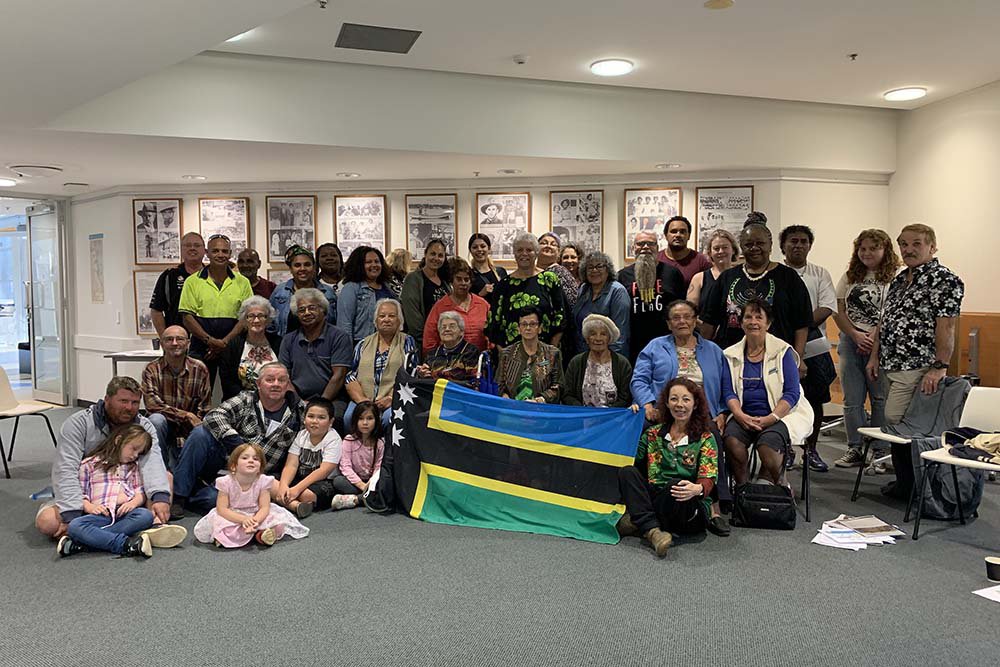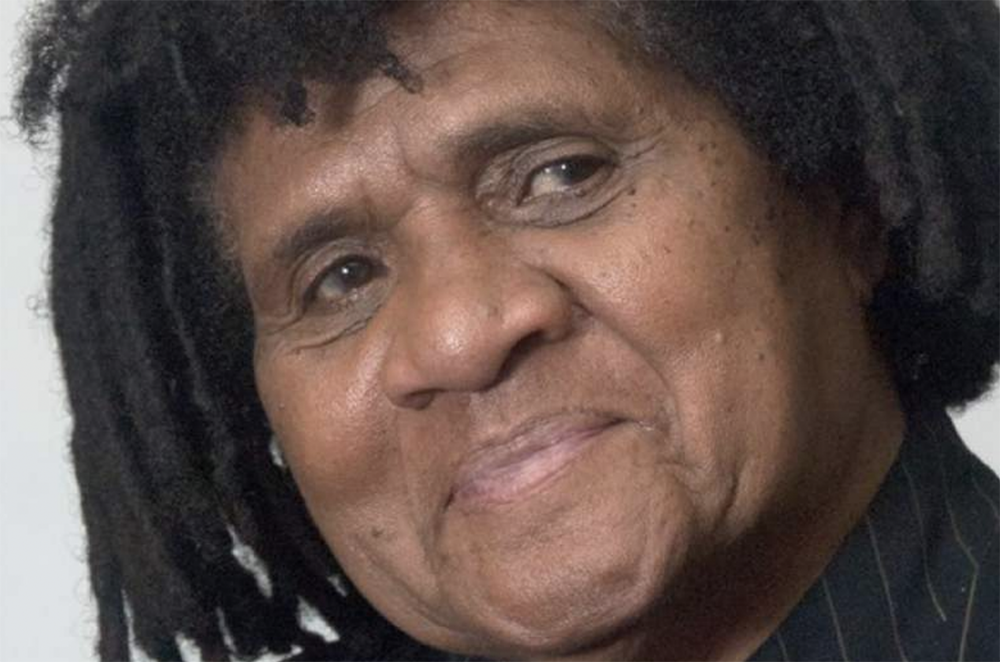Australian South Sea Islander Recognition Day
Written by (Waskam) Emelda Davis, chairwoman of the Australian South Sea Islanders (Port Jackson) (ASSIPJ).

A collective community voice for displaced Pacific communities.
The 25th August marks Australian South Sea Islander (ASSI) recognition week on our national cultural calendar. Prime Minister Paul Keating recognised ASSIs as a ‘distinct cultural group’ whose identity and community needs were legislated under the 1994 Commonwealth. The domino effect of recognition saw the 1995 NSW Premier Bob Carr memorandum followed by Queensland Premier Peter Beatie in 2000 and NSW Member for Sydney Mr. Alex Greenwich motion in 2013.
ASSIs are a displaced Pacific community as a result of Australia’s first Seasonal Workers Scheme. Historically named the ‘Indentured labour trade’ ASSI communities identify strongly with the truth of the matter that this was a Blackbird trade of the Pacific.
This trade started illegally sixteen years earlier with men stolen from the islands of Tanna in Vanuatu and Lifou in New Caledonia. The first 200 men on round adventures were brought to Eden NSW by entrepreneur politician Benjamin Boyd in 1847 to labour alongside Maori and First Nations peoples.
In 2017 Jeff Mc Mullen bitter truth about the Blackbirding trade was also commemorated in NSW some 170 years later remembering the mass deportation and the men’s escape to walk back to Sydney seeking passage home to Vanuatu on a recruiter ship and were denied passage. One ‘man Tanna’ is reported in the Sydney Morning Herald under ‘Boyd’s South Sea Islanders’ as having been found deceased in Sydney Harbour. It’s believed the man was swimming out to the heads. Another four men were documented as dying under Boyd’s experimental regime.
Australia’s sugar (agricultural), pastoral, fishing and cotton industries required what followed as the influx of 62,500 men (95%), some women (5%) and children (unknown) trafficked illegally and immorally to Queensland between 1863 – 1908. Human trafficking from across the Black Oceania of Australia the Melanesian heritage region saw the 83 Pacific islands of Vanuatu and Solomon’s included Tuvalu, Kiribati, Papua New Guinea and New Caledonia reaped of their populations for over four decades. The stability in our economy todays is the legacy of our South Sea Islander forebears and descendants.
The Australian South Sea Islander flag

© Flags Australia
The official Australian South Sea Islander flag was initially designed in consultation with the ASSI community and executive of the then Australian South Sea Islanders United Council (ASSIUC) in 1994.
ASSI recognition day ceremonies are seeing the flag raised across the nation by government agencies for the first time since 2018. Bipartisan support for motion by Inner West Council (IWC), Sydney NSW Mayor Darcy Byrne saw the inaugural flag raising at Petersham Town Hall with the support of the Local Metropolitan Aboriginal Land Council (LMALC), Indigenous Peoples Organisation (IPO), Torres Strait Islander representatives and our communities.
The Australian National Maritime Museum followed suit in 2019 with a Dignitary National Flag Raising for ASSI 25th Anniversary since Commonwealth recognition and design of the flag. Some 200 guests inclusive of speakers Foreign Ministers the Hon. Marise Payne and Vanuatu Foreign Minister the Hon. Ralph Regenvanu.
Christian Brothers Lewisham (CBL) - Sydney NSW & IWC Mayor Darcy Byrne raised the flag in recognition of ASSI 25th Anniversary and in the name of a shared community remembering South Sea Islanders (SSI) that came and lived and worked in the area from the 1800s. My grandfather Moses Enares and Mr. Togo were among other families who were connected to John Street in the suburb of Ashfield. Oral histories said this was SSI go to house where Moses worked as a dish hand and others sought refuge. Assistant Principal of CBD - Mr Dan Valencic says "Cristian Brothers is the first school in Australia to fly the ASSI flag on our external flag poles”. This annual acknowledgement is in-lieu of the school flag every August 25th marking ASSI recognition Day.

© CBL
Vanuatu Independence Day
Vanuatu Independence Day falls annually on July 30th and this year marked 41 years since Vanuatu gained their independence from Britain and France. Bundaberg Regional Council (BRC) gathered local communities and the Vanuatu Seasonal Workers for a momentous occasion and first for an Australian government agency where the far north Queensland Mayor Jack Dempsey made an historical ‘apology’ to Vanuatu and their ASSI descendants for the pain and suffering caused through the history of Blackbirding.
The symbolism of raising the Vanuatu flag on the countries special day sent a message across the Pacific and Australia reaffirming the Councils genuine commitment as part of the signing of a historic ‘Sister City’ agreement with Luganville Municipal Council on Santo Island, Vanuatu. Streaming live on social media, Australian and Vanuatu communities witness this great partnership between two great cities. This is the first agreement of its kind for a ‘Sister City’ between a city in Australia and a city in Vanuatu. His Excellency, Vanuatu High Commissioner to Australia Mr. Samson Vilvil Fare met with Mayor Dempsey in March this year to initiate the partnership in recognising that both cities have a strong bonded historical relationship and wide diverse community. Bundaberg and Luganville share a lot of common traits being (i) coastal cities, (ii) touristic and (iii) agricultural as well as we have a direct latitude connection from port to port which received our forebears and Seasonal Workers still today on the traditional lands of the Taribelang Bunda, Gurang, Bailai, Gooreng Gooreng country. Mayor Jack Dempsey was the former Aboriginal and Torres Strait Island minister for QLD state and has demonstrated a long standing commitment to the Bundaberg First Nations and ASSI communities which was evident when he attended the inaugural national Wantok 2012 conference funded by federal government (PMC). Wantok 2012 witnessed the Vanuatu Council of Chief conduct an apology ceremony to traditional of the Bundaberg region for their SSI forebears damage to country.
Today the Bundaberg region is home to one of the largest communities of Australian South Sea Islanders of which many were able to trace their roots back to the Island of Santo, Vanuatu. Santo families in Australia are the largest families married into our First Nations families across QLD to the Torres Strait Islands.

© BRC
The Vanuatu and Aboriginal flags were raised in recognition by local associations Yumi Olgeta Wellness pastoral carers Jane & Geoff Smith with the Bundaberg ASSI Heritage Association President Coral Walker.
Such heroic gestures have given the ASSI community a greater sense of belonging and the energetic field is nationwide for a continued and collective community advocacy for rightful inclusion of a community that has gone unnoticed for some 174 years.
The Tweed Heads Australian South Sea Islander United Council (ASSIUC) was founded in 1972 by Mr & Mrs Les & Marg Togo, Mr. & Mrs Phyllis & Zane (Robert) Corowa, Ms. Rita Dodds, Mr. Bill Wogas, Mr. Bernard Carter joined by Mr. Lance Skinner in 1980 to date. By 1974 there were approximately 14 ASSIUC branches across NSW and Queensland.
The Tweed community representatives drove the 1992 HREOC Report ‘The Call for Recognition’ census campaign initiated through the support of Sydney’s Evatt Foundation headed up by Mrs. Faith Bandler AO who is also renowned for championing the ‘1967 Vote Yes’ campaign that saw Indigenous Australian’s included in the census. with ASSI leaders in NSW/QLD to gather statistics on the situation of Blackbirded descendants. Findings identified ASSIs suffered the same disadvantage as their First Nations families and peoples.
The once ASSIUC head office has morphed into the Tweed Gold Coast Australian Sea Islander Community Association (TGCASSICA) an organisation that has maintained the cultural heritage teachings of ASSI people since it was founded in 1972. Some 49 years of national, northern NSW and Gold Coast representation today the organisation is championed by Ms. Fiona Mount and Ms. Jodie Togo with continued support by local knowledge keeper and community historian Mr. Lance Skinner former secretary.

© Tweed Gold Coast Australian South Sea Islander Community Association
The TGCASSICA membership is representative of a proactive ASSI elders advisory along with next generations who have sustained the political and local challenges as they continue to advocate for greater inclusion across programs and services.
More recently the membership have played a key role working with NSW Health Infrastructure on the developments for the new Tweed Valley Hospital. The new hospital will incorporate the repurposing of the heritage from the region in ‘Rockwall’s’. In respect for the knowledge base and deep seeded ASSI history and established body of cultural maintenance work by the Tweed association the infrastructure and public displays will be complimented with a combination of digital imagery of ASSI history narratives that commemorate, recognise and celebrate the contribution of ASSIs to the region. This public historical monument is a first of its caliber under the NSW Government that recognises five decades of resilience and cultural maintenance by the organisation. Many of the local Tweed Heads families have an entrenched ASSI and deep seeded knowledge and connection to the local area as a demographic that moved away from community control before Federation and what we call today the state of Queensland.
Our languages matter
As a result of the trade culturally diverse languages such as Pijin English are a combination of English words with grammatical structures from the Pacific region and Indigenous Australia.
Pijin English is also called Tok Pisin, Solomon’s Pijin, and Bislamar, which is the common language spoken throughout the Pacific. Bislamar was developed in Bundaberg far north QLD during the 1860s to 1880s as an organic means of communication between Indigenous peoples of Australia and the and as a means of communication with colonisers. Today Bislamar is Vanuatu’s national language and Blackbirding (since 2013) is taught as part of the Vanuatu curriculum.
Creole is spoken mainly in the Torres Strait Islands by descendants of the ‘Blackbirding’ trade with a small increase of Bislama and Solomons Pijin on the mainland as descendants have been relinking with our families and practices in Australia and the Pacific.
We share Aboriginal English slang with common words of ‘gamin’, ‘savvy’, ‘deadly’ ‘humbug’ and use interconnected words like ‘South Sea’, ‘Kanak’ or ‘Kanaka’, traditionally the Hawaiian term for bushman.
The term ‘Wantok’ is a Melanesian custom word that identifies kinship systems and means a bond and knowingness across our Melanesian regions. It is used as a term of endearment in dialogue amongst members mainly of the Australian South Sea Islander community.
This article was written by (Waskam) Emelda Davis, chairwoman of the Australian South Sea Islanders (Port Jackson) (ASSIPJ).
Collection information
Stay in the know
Keep in touch and experience our cultural programs and educational offerings, many of which are community inspired and led.
Subscribe now




